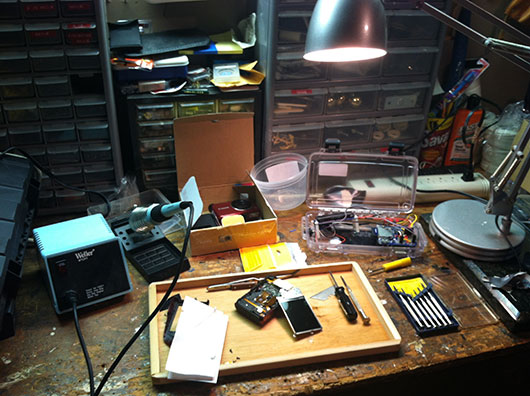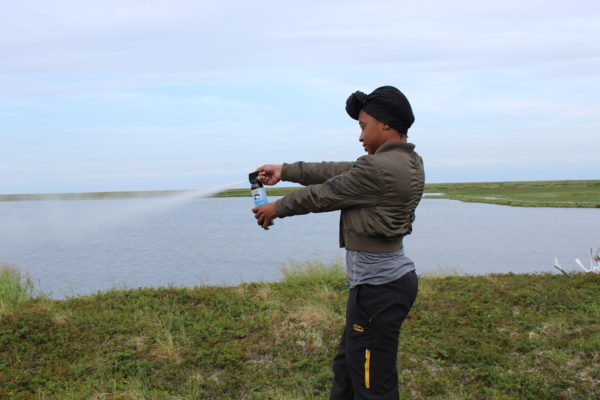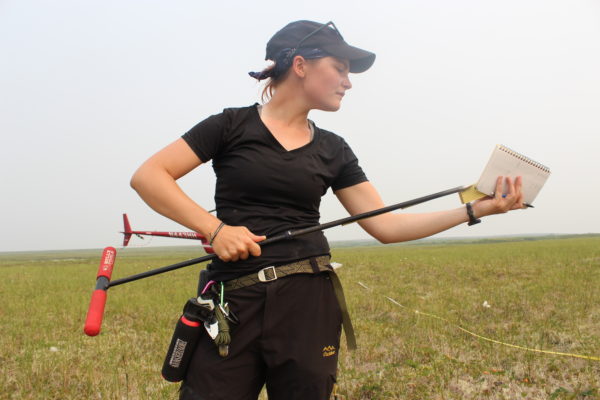Prior to sitting down and beginning to write this post I hadn’t given much thought as to what I would study in Siberia. My scientific background has focused on soil geography—what makes up soil and how it is layered—and plant / water relations—photosynthesis and the absorption of and eventual transfer of water back into the atmosphere by plants. I have spent time at Colgate studying soil in a particular environment, attempting to understand how that environment influences decomposition of plant matter and the release of carbon back into the atmosphere from the soil. I imagine myself extending my study of soil, plants and water to a completely different environment that I am not used to in Siberia. I am excited to apply some of the methods I have read about and used in other environments to yield new and different results specific to the unique ecosystems around Cherskiy.

Designing the data logger
Although I have these specific topical interests, the path that led me to apply to the Polaris Project was less focused on science and more focused on the process behind science, the data collection, measurements, and methods of analysis used to investigate natural phenomena. I’ve spent the past few months designing a reliable, low-cost circuit to record environmental information in Siberia. This circuit (called a data logger) I’m designing is a small electronic device that uses sensors to automatically collect information—temperature, for example—at regular intervals over a set period of time, ranging from days to years. This information is stored on an SD card (like photos in a camera) for future retrieval. Designing, building, and testing these sensors has been a very fun and rewarding challenge and I am excited to see them put to use in Siberia and elsewhere. However, beyond this I am fascinated by the potential of what remote sensing (a more general term for data collection by machines ranging in complexity from data loggers to satellites) can do for science. The ones I am designing perform a simple task: recording temperature. However, this is a task that would be impossible if it weren’t for this technology, as no one ever could record hourly variation in temperature in one spot in Siberia for a year with the same level of unyielding precision. I am constantly thinking of what a more complicated remote sensing apparatus might be able to achieve, what information it would collect, and how it will contribute to science. I have also disassembled (and in one case broken) a secondhand digital camera to turn it into a near-infrared camera. This camera will be used to take photos of plants capturing reflected near infrared light normally invisible to humans which can then be analyzed by a computer to infer the amount of photosynthesis occurring within these plants. I can’t wait to see if what I come up with works in the field and if there are any potential improvements I can make to such a device. Nonetheless I am amazed by these devices’ abilities and the questions that they pose. They allow scientists to think about things that could never be observed or even seen by the human eye. Each device allows us to answer an endless variety of questions, which we would otherwise be unable to answer.
I look forward to arriving in Siberia because I will be able to conduct some research in the fields of interest concerning soil and plant / water relations and hopefully explore things, which we would otherwise be unable to explore. However, I also look forward to seeing what other participants are studying and how they are going about it. I love encountering different methods of looking at ecosystems because it expands my own scientific viewpoint and provides an opportunity to dream up new methods of studying the world.




Comments(3)-
-
-
Luis Weber says
June 23, 2014 at 3:34 amJust wow!
That is great!! That kind of technology allow us “to think about things that could never be observed or even seen by the human eye”. You could not say it better.
I’m looking forward to seeing the devices!
See you soon my friend!
Peter Han says
June 26, 2014 at 9:07 pmSweet. I like the long-term thinking here. What got you into remote sensing in general?
Kathryn Black says
June 29, 2014 at 5:22 pmThis is so impressive! I can’t wait to hear more about your adventures in Siberia. I want to hear more about the device you developed when I see you next. Stay warm!